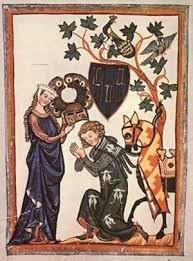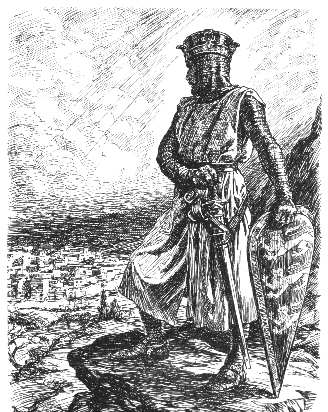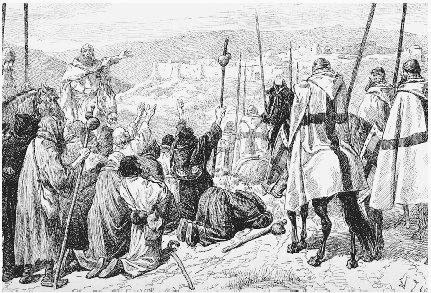Ralph, whose tale in the ballad, is not fictitious but based on the true story of Reginald Blanchminster, a devoted husband and father, abandoned for another man by Isabel his adulterous wife.
Ralph's real name was Reginald, he was the Blanchminster heir, born around the middle of the thirteenth century.
Reginald Blanchminster was the brother of my 20th great grandmother, both have a very very special place in my heart.
".........In Hawkers ballad we see the fictitious Bertha as a young woman who was already resolved of the fact that her husband will not return to Binamie with his life, she states “Time trieth troth” or “time tests faith” She goes on to give Reginald a time frame and a ultimatum stating “three years let the severing seas divide” and “a warrior must rest in Bertha's bed”. Obviously undeterred by these words from his wife, he cries a sad farewell to his turreted castle and riding into the distance shouts "Thou too farewell my chosen bride" Hawker then goes onto suggest in the verse “The Treachery” that Bertha had not kept her side of the bargain. In a wilful betrayal of fidelity, Bertha becomes an adulterous wife fleeing Ralph’s manor of Binamie on the call of one Sir Rupert! The Cornish messenger tells the dying Ralph of three dark omens in a kindly effort to break the new of Bertha's betrayal but the astute Ralph asks “Say on the woe thy looks betide” to which the poor page has to reply “Master, the Lady Bertha s fled the hall."
Reginald’s wife in Hawkers ballad is named Bertha, in fact she was Isabel, a woman who we know little about. At this point Reginald had been married only a few years and between 1262 and 1265 Isabel had given Reginald a son who they named Ralph. During the next five years Reginald became increasingly unhappy and his family think that this was due to the discontent he felt on having heard of the decision of the young prince Edward and Edmund of Cornwall leaving on a crusade to the Holy Land, but we now know is that this could not be further from the truth. At prayer and his frequent times spent alone he struggled with his conscience, asking himself whether he should he remain at his Cornish manor or if he should take up the cross himself. Ralph’s decision to journey to the Holy Land would have been either duty or religious sentiment. Of course both of these would have undoubtedly influenced him as it had done large masses of people who enthusiastically set out for the east to meet the Muslims in battle. Finally with his mind made up Reginald set forth in 1270 to join Prince Edward and the Earl of Cornwall on crusade.
Hawkers ballad is of the sentimental kind, very popular in the late nineteenth century, he has romanticised the tale of a hero knight and his young wife fleeing to the arms of her waiting lover, in fact Hawker was not too far from the truth.
The Sir Rupert in the ballad was one John Allet.
According to an entry for him in the Cornish Fleet of Fines it is stated
Ralph Blanchminster * She was the widow of Sir Reginald Blanchminster, and her marriage with John de Aleth had been secretly performed. ...
in a manuscript dated 1284 it states
John Allet in Kenwyn and Isabella his wife hold the Isle of Scilly and hold there all kinds of pleas of the Crown throughout their jurisdiction and make indictments of felonies.
The aforementioned * entry of Reginald’s fathers death in the Episcopal Register of Exeter we find the entry of the death of Reginald and along side it, probably written at the same time, is an entry regarding Isabel Blanchminster. The purpose of this entry regarding Reginald’s widow in this register is to record the sentence of excommunication pronounced against her for her adultery with Allett. We can assume that Isabel began an affair with Sir John Allet soon after the birth of Ralph and this was the real reason that induced Reginald to take up the cross. How poor Reginald came to know of this infidelity is not known, betrayed and rejected his journey to the Holy Land must have been a sorrowful one. Away on crusade and supposing him dead Isabel and Allet married in secret. The effect all this had on their son is not known but the news of this adulteress marriage and excommunication must have been a major scandal at the time. The Allets must have been keen to stay on good terms with Reginald’s sister Margery, for we know that the two families were still in contact by 1290 as John Allet witnessed a gift of land on the 9th June.
After this date both Isabel and Allett fade into obscurity.
The Vow
Hush! Tis a tale of elder time
Caught from an old barbaric rhyme
How the fierce Sir Ralph, of the haughty hand
Harnessed him for our Savious land.
“Time trieth troth” the lady said
“And a warrior must rest in Berthas bed.
Three year let the severing seas divide,
And strike thou for Christ and they trusting bride”
So he buckled on the beamy blade
That Gaspar of Spanish Leon made
Whose hilted cross is the awful sigh
It must burn or the Lord and his tarnished shrine.
The Adieu
“Now a long farewell tall Stratton Tower
Dark Bude, thy fatal sea
And God thee speed in hall and bower
My manor of Bien amie.
“Thou, too, farewell my chosen bride,
Thou Rose of Rou-tor land
Though all on earth were false beside
I trust thy plighted hand.
“Dark seas amy swlll, and temests lower,
And surging bellows foam,
The cresset of they bridal bower
Shall guide the wander home.
“On! For the cross in Jesu’s land,
When Syrian armies flee;
One thought hall thrill my lifted hand,
I strike for God and thee”
The Battle
Hark! How the brattling trumpets blare,
Lo! The red banner flaunt the air,
And see, his good sword girded on
The stern Sir Ralph to the wars has gone.
Hurrah! For the Syrian dastards flee
Charge! Charge! Ye Western chivalry
Sweet is the strife for God’s renown,
The Cross is up and the Crescent down.
The weary seeks his tent
For good Sir Ralph is pale and spent
Five wounds he reaped in the field of fame
Five in his blessed masters name.
The solemn Leech looks sad and grim
As he binds and sooths each gory limb
And the solemn Priest must chant and prey.
Lest the soul un-houseled pass away.
The Treachery
A sound of horse hoofs on the sand
And lo! A page from Cornish lands
Tidings,” he said as he bent the knee
“Tidings, my lord, from Bien amie”
“The owl shrieked thrice from the warder’s tower
The crown-rose wither in her bower
Thy good grey foal, at event fed,
Lay in the sunrise stark and dead”
“Dark omens three!” the sick man cried
“Say on the woe thy looks betide”
“Master! At bold Sir Rupert’s call,
Thy lady Bertha fled the hall
The Scroll
Bring me,” he said “that scribe of fame,
Symeon el Siddekah his name
With parchment skin, and pen in hand
I would devise my Cornish land.
“Seven goodly manors, fair and wide,
Stretch from the sea to Tamar side,
And Bien amie, my hall and tower,
Nestles beneath tall Stratton Tower
“All these I render to my God,
By seal and signe, knife and sod
I give and grant to Church and poor
In franc-almoign for evermore
“Choose ye seven men among the just,
And bid them hold my lands in truse:
On Micheal’s morn, and Mary’s Day,
To deal the dole, and watch and pray.
“Then bear me coldly o’er the deep,
Mid my own people I would sleep
Their hearts shall melt, their prayers will breathe,
Where he who loved them rests beneath.
“Mould me in stone as here I lie,
My face upturned to Syria’s sky
Carve ye this good sword at my side
And write the legend, “True and tried”
“Let mass be said, and requiem sung;
And that sweet chime I loved be rung,
The sounds along the northern wall,
Shall thrill me like a trumpet call”
Thus said he, and the set of sun
The bold Crusader’s race was run.
Seek ye his ruined hall and tower
Then stand beneath tall Stratton Tower
The Mort Main
Now the Demon had watched for the warrior’s soul
Mid the din of war where blood streams roll
He had waited long on the dabbled sands,
Ere the Priest had cleansed the gory hand
Then as he heard the stately dole,
Wherewith Sir Ralph had soothed his soul
The unclean spirit turned away,
With a baffled glare of grim dismay.
But when he caught those words of trust,
That sevenfold choice among the just,
“Ho! Ho! Cried the fiend with a mock at heaven
“I have lost but one, I shall win my seven.”




 RSS Feed
RSS Feed
